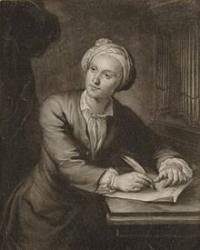Planning worship?
Check out our sister site, ZeteoSearch.org,
for 20+ additional resources related to your search.
- |
User Links
Search Results
Father, in whom thy saints are one
Author: G. B. Timms, 1910-1997 Appears in 3 hymnals Text Sources: Freely based on Latin hymns for All Saints
Father, in whom thy saints are one
EXULTET COR
Appears in 2 hymnals Tune Key: c minor Incipit: 22224 65422 31243 Used With Text: Father, in whom thy saints are one
EXULTET COR
Father, in whom thy saints are one
Author: George Boorne Timms, 1910-1997 Hymnal: CPWI Hymnal #818 (2010) Meter: 8.8.8.8 Lyrics: 1 Father, in whom thy saints are one,
bought by the blood of thy dear Son,
we praise thee for thy hallowing grace
in those who now behold thy face.
2 For they have gained eternal rest,
and in the heavenly mansions blest
they dwell among the angelic throng,
and hear the one unending song.
3 The patriarchs and prophets old
the heavenly splendour now behold;
the Baptist, herald of thy Son,
enjoys the fruit of labour done.
4 But first among the saintly band,
the mother, at her Son's right hand,
adores the Saviour's endless love,
in that eternal home above.
5 The twelve now see the Father's face,
while all who've run their earthly race
in one glad company rejoice
to hear the heavenly bridegroom's voice.
6 Father of all, to thee we pray,
keep us for ever in the way
that leads us to the heavenly rest
among the glories of the blest.
7 To God the Father, God the Son,
and God the Spirit, Three in One,
all worship, love and honour be,
both now and in eternity. Topics: Saints' and Other Holy Days All Saints Languages: English Tune Title: DEVONSHIRE
Father, in whom thy saints are one
Father, in whom thy saints are one
Author: G. B. Timms, 1910-1997 Hymnal: The New English Hymnal #196a (1986) Topics: All Saints November 1st; Office Hymn; The Christian Year Festivals and Other Holy Days: Proper Languages: English Tune Title: EXULTET COR
Father, in whom thy saints are one
Father, in whom thy saints are one
Author: G. B. Timms, 1910-1997 Hymnal: The New English Hymnal #196b (1986) Topics: All Saints November 1st; Office Hymn; The Christian Year Festivals and Other Holy Days: Proper Tune Title: KENT
Father, in whom thy saints are one
G. B. Timms
1910 - 1997 Person Name: G. B. Timms, 1910-1997 Author of "Father, in whom thy saints are one" in The New English Hymnal Full name George Boorne Timms
G. B. Timms
John Frederick Lampe

1703 - 1751 Person Name: J. F. Lampe, 1703-51 Composer of "KENT" in The New English Hymnal John Frederick Lampe (born Johann Friedrich Lampe; probably 1703 – 25 July 1751) was a musician.
He was born in Saxony, but came to England in 1724 and played the bassoon in opera houses. His wife, Isabella Lampe, was sister-in-law to the composer Thomas Arne with whom Lampe collaborated on a number of concert seasons. John and Isabella's son, Charles John Frederick Lampe, was a successful organist and composer as well.
Like Arne, Lampe wrote operatic works in English in defiance of the vogue for Italian opera popularised by George Frideric Handel and Nicola Porpora. Lampe, along with Henry Carey and J. S. Smith, founded the short-lived English Opera Project. He became a friend of Charles Wesley, and wrote several tunes to accompany Wesley's hymns. His works for the stage include the mock operas Pyramus and Thisbe (1745) and The Dragon of Wantley (1734), which ran for 69 nights, a record for the time, surpassing The Beggar's Opera. He was based for a time in Dublin and later in Edinburgh, where he died.
--en.wikipedia.org/wiki/
See also in:
Wikipedia
John Frederick Lampe


 My Starred Hymns
My Starred Hymns


